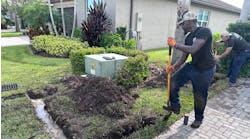Life is great when your phone is ringing off the hook and customers are requesting service. Usually, this happens during and after extreme weather conditions, forcing customers to call you for service.
Contractors want weather to be below 30°F or above 90°F with no mild weather in between, so bring on the bitter temperatures of winter, the sweltering hot days of summer and the flash flood waters of spring. Is this too much to ask for? Can the seasons jump from one extreme to another?
Many contractors tend to be passive, relying on the weather and other externals to create business. There is nothing wrong with that — I actually prefer to be passive, who doesn't? It's easier to make money when the business is operating in passive mode. Heck, it's an easy process to implement as well.
What are the other externals contractors rely on for business besides the weather? Marketing is one, including tactics like your marketing plan, yellow page ads, truck graphics, magnets, valve tags, customer referrals, radio and television spots, yard signs and inbound phone scripts. Both of these externals force customers to call you. They are being proactive by calling you while you are passively taking their service calls.
Supply and Demand
You have the supply — the service, they have the demand — something needs to be fixed. Times like these are when contractors make boatloads of money, and everything is going great. The passive side of the business is hitting on all cylinders. Then it happens, you run into a series of golfing days — it's beautiful outside, 70°F and no wind, rain or humidity.
Golfing days are the other side of the coin — the proactive condition, which is important for all contractors to focus on. When proactive, contractors are preparing for, intervening in and trying to control an expected occurrence or situation.
As we all know, it's impossible to control the weather any more than when customers call for service. However, if you are waiting for customers to call you and extreme weather conditions, you should seriously think about closing your business. Your passive business will stagnate and never make a consistent profit. The good news is everyone can be proactive. You don't need money to be proactive — you need effort.
Plan ahead
Here's how you make sure you get enough calls. It's a simple matter of being proactive — you need to plan ahead. Nexstar has created a three-day call board, so everyone in your company knows what they're up against and what effort is needed.
Here's how it works: determine the number of technicians working the next three days, figure out the weather forecast and decide how many pre-booked service calls you want per working technician.
For example, I like to have at least three calls planned per technician per day. I like knowing a day in advance that I have at least three calls booked on my board per technician for tomorrow. By the end of the day, I want to know I have two calls per technician two days out and one call per technician on the third day out, based on the factors I have in this example. Build a known base of calls everyday, so you're controlling more variables.
Also, know the weather forecast for the next few days. If I know it's going to be -10°F for the next two days, I will set my goal at zero calls for those two days since I can be sure customers will call me.
The goal is to have zero variances each day. Your customer service representatives will update the board with every call booked. By the end of the day, you should expect calls to be booked either by inbound calls or outbound calls.
When starting outbound calling, first call any recently inactive proposals. Next, open your recent Summary of Findings sheets from your technician's Nexstar Service System paperwork, and call on recent tasks left on the table. Then call customers you haven't heard from in the last 12 months. The last people to call should be service maintenance customers because you know you're going back to them.
Proven Script
You should use the following script for times when you don't have any inbound calls. (Please do not change one word of this script, it works.)
“Hello Mrs. (customer name), this is (CSR's name) with (your company name). It's time to check your system. Would Monday or Tuesday work best for you?”
This script works because the customer is asked to make a decision on what day is more convenient — not whether they want service. It's subtle, and it works.
The bottom line is that you can run a proactive business by having your CSRs make outbound calls, taking control of profits and growing your business instead of wishing you had more business while you passively wait for the phone to ring.
Jim “Bone” Hamilton is a business coach with Nexstar Inc., a business-development and best practices organization delivering business training, systems and support to independent home service providers, specifically electricians, plumbers and heating and air conditioning professionals. Additional information is available at: http://www.nexstarnetwork.com.

